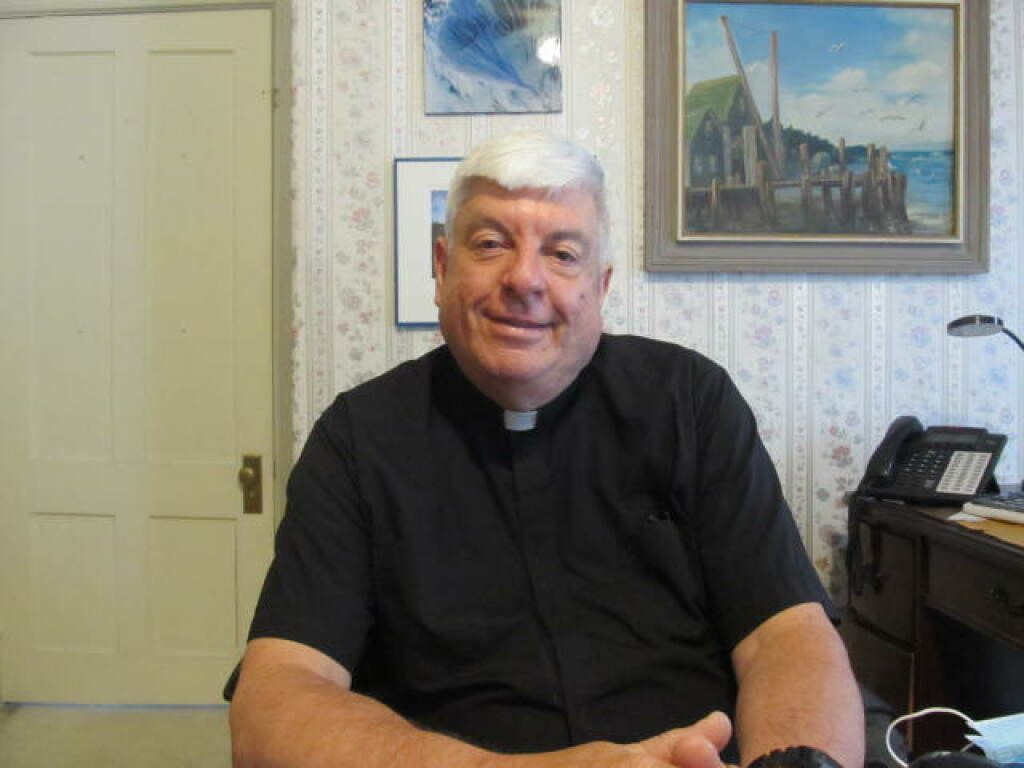 May They Learn To Be One!
May They Learn To Be One!
To help us understand today’s gospel reading, I want to begin with a story… It was the first time a family had saved up enough money to rent a cottage at the beach. After unpacking and somewhat arranging things, they all picked up their towels and went to the beach. The children were running in and out of the surf and building sand castles when, in the distance, a stooped-over old woman appeared. Her scraggily gray hair was blowing in the wind and her clothes were dirty and ragged. She was muttering something incoherent to herself as she picked up things from the beach and put them into a plastic bag.
The parents quickly called their children to their side and told them to stay away from that old lady. As she passed by, bending down every now and then to pick up things, she smiled at the family. But her greeting wasn’t returned.
It was later on that a longtime resident of the beach community told them that the little old lady had a son who, years ago, once cut his foot on something on the beach and his foot later became severely infected. Since then she made it her lifelong crusade to pick up bits of glass and cans from the beach so that children would not cut their feet.
Now, I understand that it is natural to be protective, to shy away from those perceived as a threat, to be uncomfortable with those who are strange or different. But I want to look at something deeper, more challenging, and far more scary. What I want to examine is: why this ugly change in the crowd that listened to Jesus at the Nazareth synagogue. At first, they seem warm and welcoming; it says that they spoke highly of him and were amazed at the “gracious words that came from his mouth.” He was the hometown boy who had made good. They had heard about his preaching and miraculous cures elsewhere, and now here he was in their synagogue. So, the question is: why did this nice congregation of people turn into an angry mob that wanted to kill Jesus?
Years ago, when I studied some sociology in college, I remember learning about “in groups” and “out groups”. The “in group” is the group of people with which an individual identifies: one’s family, one’s school, one’s close friends. But “out groups” are those with whom one does not, and probably doesn’t want to, identify. There is a separation of identity, of “we” vs. “they,” of “us” vs. “them”. Often membership in a group is based on ethnic identity, race or culture. The people of the “in group” have similar tastes, opinions and behavior. They have a positive attitude toward the members of their group; and often a quite negative attitude toward those who are different, the outsiders. For the “in group” there is cooperation, good-will, mutual help, and a sense of solidarity. But attitudes toward the “out group” include avoidance, dislike, indifference and antagonism.
So what’s going on with the reaction to Jesus’ homily in the synagogue? First, the references Jesus makes are stories in the history of Israel with which members of the congregation would have been quite familiar. Elijah and Elisha were popular prophets and miracle workers that were considered shining lights in Israel’s past.
The problem, I think, is that Jesus, even by using facts with which they were familiar, got them into the in group/out group frame of mind. He reminds them that Elijah performed a miracle for a widow of the Phoenician city of Sidon, which is now the third largest city in Lebanon. Elisha performed a miracle of cleansing a leper from Syria. In simple terms, Jesus highlights that Elijah and Elisha went outside their “in group” and did something nice for the Arabs. And the hostility of the in group/out group division starts to boil: good-will and solidarity are replaced with dislike, antagonism, and, finally, the desire to murder Jesus.
It has happened here in our nation. Martin Luther King, Jr. was executed the day after he spoke up for some garbage workers, and for not knowing his proper place in society. The same thing happened to John and Robert Kennedy. And contrary to claims that it was a “nice visit by some tourists,” we all could see for ourselves what happened on January 6, 2021. On that day we saw the violence, the hate, the noose prepared for the hanging of the Vice President, the desire to murder. One group of Americans attacked another group of Americans. That, by definition, is not a nice, touristy day in the nation’s capital.
Going back to the gospel, we note that as Jesus continued his ministry, he seemed to meet opposition all along the way. One of the main reasons was that he was constantly mixing up the “in group” and the “out group.” He was accused of “welcoming sinners and eating with them,” of being nice to Roman soldiers, of breaking the rules set by the religious authorities, of saying things about God that weren’t supposed to be said, of making tax collectors, public sinners, and people at the bottom of society members of his “in group.” And at the Last Supper he celebrated communion with one man, one of the leaders, who would deny even knowing him and another who would sell out and betray him. But he ate with them nonetheless. It was similar when he had miraculously fed thousands of people without making them pass some kind of test for belonging. The disciples wanted to divide them up by having the people go into the villages to buy bread, but Jesus said no, we’ll unite them by feeding them all right here. While so many people around Jesus were thinking in terms of “in group” and “out group,” of building oneself up at the expense of another, Jesus went in the opposite direction, smashing down the walls and barriers that kept people apart. As a matter of fact, Jesus’ dying wish—part of his prayer at the Last Supper—was: “Father, may they be one as you and I are one.” For that kind of thinking the crowd in Nazareth wanted to kill Jesus, and sometime later, the crowd in Jerusalem succeeded in making sure that he was killed. But Jesus’ plea continues to echo down through the centuries, and I think it should make us stop and think, it should challenge us to the core of our being: may you be one, as my Father and I are one! Can we do that? Can we put aside the prejudice, division and hatred? And we look for common ground and focus on what should unite us? If we are Christian in fact, and not just in name, I believe we have to.




